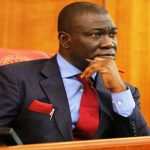...To get all news updates, Join our WhatsApp Group (Click Here)
Also Join our WhatsApp Channel (Click Here)
Mele Kyari, group chief executive officer (GCEO), Nigerian National Petroleum Company (NNPC) Limited, says the country will stop importing petroleum products by mid-2023.
Kyari spoke at a press briefing at the state house in Abuja on Tuesday.
He said the combination of output from the Dangote refinery (scheduled to begin next year) and state-owned refineries would “eliminate any importation of petroleum products into this country”.
“Even if all our four refineries in three locations are operating at 90% of installed capacity, they will only be able to raise 18 million litres of Premium Motor Spirit (PMS). That means even if all of them are working today, you would still have a net deficit of PMS to import into this country,” he said.
The GCEO added that because Nigeria’s population, the middle class as well as demand has grown, the volume of petrol required in the country has increased.
He said NNPC owned 20 percent equity in the Dangote Refinery and has a first right of refusal to supply crude oil to the plant.
“But we saw this energy transition challenge coming. We knew that time will come where you would look for people to buy your crude and you will not find,” he said.
“And that means we have locked down ability to sell crude oil for 33,000 barrels minimum by right for the next 20 years and by right also we have access to 20 percent of the production from that plant.”
Kyari added that the Dangote refinery would begin producing by the middle of next year, adding that it can produce up to 50 million litres of PMS.
“The combination of that and our ability to bring back our refinery will eliminate any importation of petroleum products into this country next year. You would not see any importation into this country next year,” Kyari said.
“This is very practical. As a matter of fact, when we are done with our own refineries and the Dangote refinery, there remain other small initiatives that we are doing, small modular condensate refineries that we are building. If that happens and we are very optimistic it will happen, you would see that this country will now be a net exporter.
“As a matter of fact, it will be a hub for the export of petroleum products, not just to the West African sub-region. This will happen. The flow of supply will change by the middle of next year, it will change. You will not need the importation of petroleum products into this country by the middle of next year.”
You can get every of our news as soon as they drop on WhatsApp ...To get all news updates, Join our WhatsApp Group (Click Here)
Also Join our WhatsApp Channel (Click Here)

















